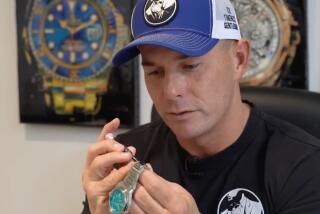Alarm Firm Owner Pleads No Contest to Charges
- Share via
The owner of a Sherman Oaks company pleaded no contest to six misdemeanor criminal counts of cheating senior citizens by selling them overpriced or unnecessary home alarm systems, according to the Los Angeles city attorney’s office.
Jeffrey Roy Bagg, 44, of Rancho Park was charged with operating an unlicensed alarm company and conducting an alarm company business from a location other than the one for which a license was issued, said Deputy City Atty. P. Greg Parham.
Bagg, who ran his business under the names ITT Security Inc. and ITT Security Systems Inc., faces a maximum penalty of six years in County Jail and $6,000 in fines, Parham said. Bagg could not be reached for comment.
Co-defendant Katrina Carmel Jackman, 37, of Glendale on Feb. 8 pleaded no contest to two counts of illegally displaying an alarm company license, Parham said. Jackman, who was a saleswoman, is scheduled to be sentenced March 14 and faces a maximum of one year in jail and $2,000 in fines.
A restitution hearing for Bagg and Jackman will be held April 18, when Bagg also will be sentenced. Restitution to victims, among them residents of Canoga Park, Chatsworth, Palm Springs, Palm Desert and Orange, could exceed $40,000, Parham said.
Bagg and Jackson, along with a third co-defendant, Melvin Taylor Hamp, 69, of St. Helena, victimized at least 26 people using false and misleading sales tactics, Parham said. Hamp was sentenced Oct. 25 to 60 days in jail or 250 hours community service and ordered to pay $10,696 in fines.
“It appeared that the defendants targeted elderly people and pressured them into buying overpriced security systems, sometimes on dwellings that already had alarms installed,” Parham said.
Victims told investigators that they were approached at their homes by salespeople who remained as long as six or seven hours to force a sale. When people tried to return the unwanted security systems, the systems would be removed but they wouldn’t get refunds. The defendants were caught after a state investigation spurred by consumer complaints, Parham said.
More to Read
Sign up for Essential California
The most important California stories and recommendations in your inbox every morning.
You may occasionally receive promotional content from the Los Angeles Times.












